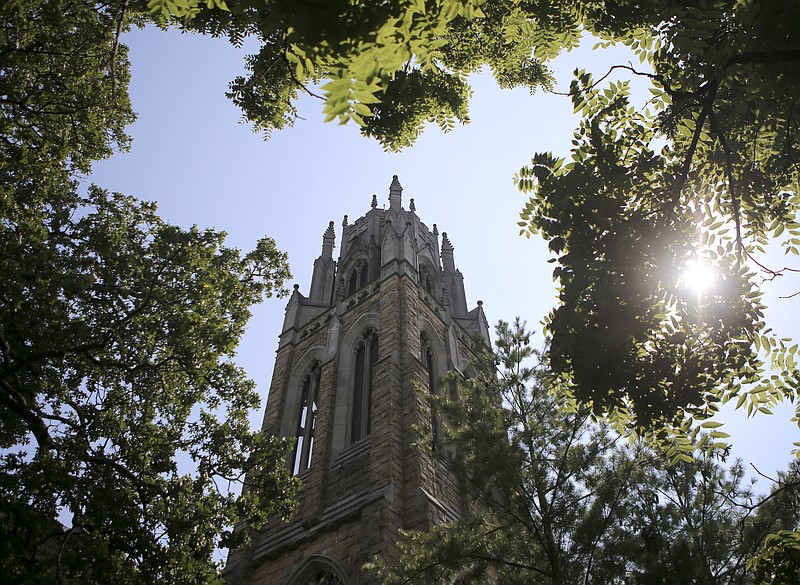"[O]ur home has been repeatedly vandalized by phantoms who came at night," the Black man said. "They have trashed our lawn with beer cans and liquor bottles. They have left threatening messages on pilfered signs near our back door. They have taken measures to ensure that my family and I saw the indecent insults that they left behind."
The man referred to wasn't Dr. Martin Luther King Jr. or Medgar Evers. The place wasn't Montgomery, Alabama, or Jackson, Mississippi. The year wasn't 1959 or 1963.
The Black man who spoke those words was Reuben E. Brigety II, vice chancellor and president of Sewanee - The University of the South. The place was Sewanee, Tennessee. And the year he described was 2020.
The racial intolerance alive, well and thriving in many Southern states in the 1950s and early 1960s was supposed to have been stamped out, destroyed by a persistent biblical wrongness and by a civil rights movement that - eventually - made even the most blind people see the evil of treating one individual different from another simply because of the color of their skin.
But, like the evils of anti-Semitism and Nazism in Europe, it has insidiously persisted. And not only was Brigety's home targeted, but only a month after he revealed what had occurred at his home, another shocking, despicable incident occurred on Sewanee's campus. At a lacrosse match last Saturday, a few Sewanee students shouted "the most vile racial epithets" at the opposing team, Brigety said.
It would be insulting to suggest - in the manner a certain American political party is wont to do - that all 1,710 undergraduate students at the school are racist, white supremacists and harbor hatred in their hearts because of the actions of "a few."
Sewanee, after all, was second (behind Tennessee State) among the most liberal universities in Tennessee in a 2021 ranking by Niche, an online platform that helps connect colleges and schools with students and families. And its profile by The Princeton Review states it "has a mostly liberal student body and faculty."
But what happened to Brigety, the school's first Black vice chancellor and president, and what occurred at the lacrosse match indicate that vestiges of yesterday's intolerance aren't limited to groups like those involved in a large protest at Charlottesville, Virginia, in 2017, or individuals like Dylan Roof, a self-proclaimed white supremacist who killed nine Black attendees at a Bible study at Emanuel African Methodist Episcopal Church in Charleston, South Carolina, in 2015.
Instead, they're present at what many of its students would consider the woke-est schools in the state.
Brigety himself, according to a school spokeswoman, "has not characterized the vandalism as either racially motivated, or not," nor has any connection been made between the incidents at the president's home and the racial epithets last weekend.
However, the president has mentioned the displeasure expressed over his desire to "lead the university in another direction" in the form of "respectful requests from dissenting alumni," "pointed letters from disaffected parents," "angry emails from passionate students," "feisty phone call[s]" and "violent posts directed at me on various social media platforms."
Exactly what his desire to "lead the university in another direction" means is unclear. However, the school's Board of Regents did release a statement in September acknowledging the school's "long entanglement with slavery, racial segregation and white supremacy." And Brigety said that "by facing up to our past, we embrace the promise of moving beyond it."
Whether those statements trouble alumni, parents and students, or whether they have other disagreements with the school, they have alternatives.
Alumni, like those at any school, can respond by withholding contributions from the university, and parents, as those elsewhere, can decide their student would be better educated at a different school. But even racially tinged responses are never appropriate.
Why students shouted racial epithets during last weekend's lacrosse match with Emmanuel College is a mystery. Emmanuel is a Christian, liberal-arts school in Franklin Springs, Georgia, whose student population is 69.3% white and 12.5% Black compared to Sewanee's 81% white and 5% Black student body. Emmanuel's lacrosse roster, according to the school, includes white, Black, Asian, Native American and Latino men. And Sewanee, after the home fans were cleared from the premises, won the match 15-11.
In the end, countries, companies, universities and organizations can make all the diversity appointments, policy changes and anti-racism pronouncements they want. But until racism is overcome and deleted from one's heart, mind and soul, it will remain extant. And there's no time to start deleting like the present.
